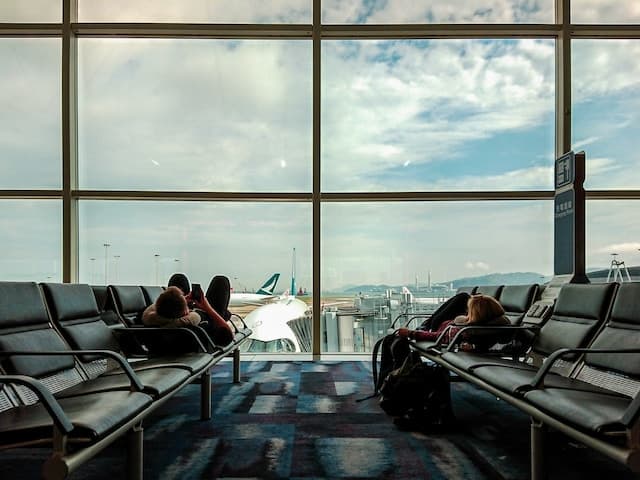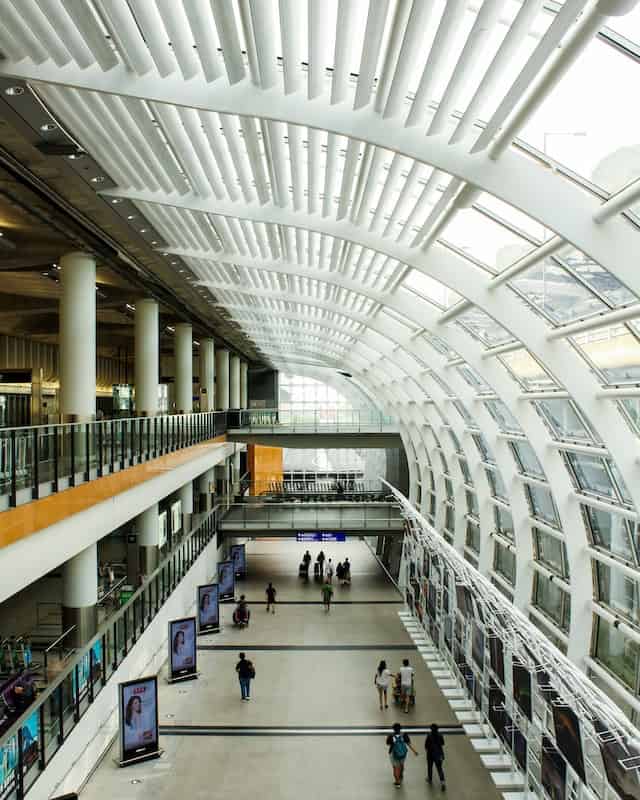Who has never been forced to use a public Wi-Fi network? Most of us have found ourselves in a situation where we needed the internet and had no choice but to connect to a public hotspot. These types of networks are handy, but are they safe?
Airports and other public places such as cafes, shopping malls, or hotels can provide you with free internet access. It’s a great solution – if you desperately need to check your bank account or send a message, you can do it even if you don’t have mobile data. But should you do it?
Airport Wi-Fi – is it safe?
If you are a traveler, you spend a lot of time at airports. Waiting to board a plane can be tedious – many people entertain themselves with mobile devices. Airports (and some planes) provide free Wi-Fi to passengers, so you can connect to the internet while traveling or waiting.
Insecure networks
What’s the difference between a home network and a public one? If you have a Wi-Fi router at home, it is probably secure – no one can connect to it without knowing the password. Public hotspots are different. Many users connect to the same one. You cannot know who is connected to the same network as you.
Public hotspot providers should take care of the security of their network, but you have no guarantee that they actually do. Wi-Fi at an airport or elsewhere can be easy to hack for someone with little technical knowledge.
Hackers sometimes use public networks to spy on traffic and intercept data. So if you use airport Wi-Fi to log onto a social media platform, you are vulnerable to potential threats. Criminals sharing your network can steal your personal information and use it in a variety of ways:
- to steal your identity
- to hack into your device
- to scam people from your contact list
- to use your passwords on other websites
- to infect your device with malware
And even if a public network uses secure protocols, such as WPA2 or WPA, it may still be unsafe. Creating fake Wi-Fi hotspots is another thing hackers like to do.
Fake hotspots
Let’s say you are waiting for your flight or staying at a hotel. You want to use the internet, so you open your device’s network settings and look for a hotspot. You see one called Miami International or Hilton hotel, so you connect to it without a second thought.
Does a public network named Hilton hotel really belong to the hotel you are staying at? The answer is: maybe. The truth is, anyone – even you! – can create a Wi-Fi hotspot and give it that name. That’s why hackers sometimes create fake networks and name them after airports, hotels, or other institutions. It allows them to spy on traffic without even breaking into any network. Your personal information is at risk if you connect to a fake Wi-Fi.
The easiest way to avoid the risk of connecting to a fake hotspot is to check if it is password-protected. Hotels and B&Bs don’t usually open their networks to anyone, so ask the staff which Wi-Fi is “official” (and what the password is).
How to increase your security?
If you don’t want to expose your personal information to third parties, you should simply… avoid connecting to public hotspots. It’s that easy! Use your mobile data whenever you can, and if you are staying somewhere, make sure the Wi-Fi is official and password-protected.
However, there are situations where your mobile data might be inaccessible. For example, connecting to the internet via your home country’s cellular network can be expensive if you have just landed in another country.
In this case, you should consider employing VPN uses. VPNs create encrypted tunnels between you and the internet, providing additional layers of security. Trusted VPN providers do not collect your data, and their tools come with handy functions. For example, VPN services can:
- protect you from malware
- block annoying ads
- stop tracking
- and more!
The function increases your safety and privacy online – even if you use a public airport network.
How to travel safely – tips
Now you know that public hotspots at airports and shopping malls are not always safe, but what should you do with this information? Here are some tips for protecting your online safety and privacy while traveling (and in everyday life):
- Avoid using online banking and other sensitive services. If you must connect to a public network, don’t use it to check your financial accounts. Your banking information is especially sensitive. Wait until you can use a safer network or use a VPN.
- Check if the websites are encrypted. Any secure website should have the HTTPS prefix in its address. The letter S indicates that the site uses SSL encryption and has a certificate to prove it. Don’t put all your trust in this, though – cybercriminals who fake websites can also encrypt them.
- Turn off auto-connecting to networks. Check your device’s settings and disable connecting to any available network. It will protect you from unwanted access to public hotspots.
- Make sure your antivirus is active. Always have malware protection running in the background of your operating system. Don’t just focus on laptops – smartphones and tablets also need protection.
- Use strong and unique passwords. A good password is at least 12 characters long and contains upper and lower case letters, numbers, and special characters. Ensure your passwords are strong and don’t use the same one on every website. If your password leaks, hackers will try to use it to access other services.


